(ATF) The stock of Reliance Industries (RIL) slumped on India’s National Stock Exchange on Tuesday, plunging close to 20% from its all-time high in mid-September, after its net profit for the quarter declined 15% and revenue from operations fell 24%.
Besides the overall bearish market, concerns over the impact of Covid-19 on demand for refining and petrochemical products, downstream margins, concerns of a global economic recovery, and its failure to meet street expectations have hit investor sentiment hard.
But many analysts still believe that despite the sharp correction there are enough supporting factors to be bullish on the most valuable Indian company’s long-term prospects.
“The biggest reason for the slide is that Reliance failed to deliver any positive surprise to the Street,” Jyoti Roy, equity strategist at Mumbai-based Angel Broking told Asia Times Financial.
The stock had also run up significantly in recent months, he added, “so all the positives were already factored in the prices. Lack of any positive triggers in the second quarter performance therefore was a dampener for the stock. To sustain the stock price of above Rs 2000-level RIL needed very good numbers that it could not report,” he said.
READ MORE: Bezos calls for probe as Ambani snaps up Future Group
After reporting weak first quarter (ending June) results, analysts expected a recovery in the petrochemical and retail businesses of RIL, while refining was expected to be weak as well.
However, in second quarter, ending in September, RIL reported much weaker refining earnings as its gross refining margin (GRM) – a key measure of profitability for an oil refining company – slipped to $5.70 per barrel in the quarter, from $6.30 per barrel in the April-June period.
“The reported GRM was RIL’s lowest in over a decade, while the throughput (amount of crude oil refined at 15.3 million metric tonnes down by 8% quarter-on-quarter) was lower [too] due to [the pandemic-triggered] shutdown,” a research report by Nomura said.
Priced for perfection
According to analysts, the correction in RIL’s stock price was long overdue, given its earnings had lagged behind the sharp rise in its market capitalisation in recent quarters.
“RIL had been priced for perfection for a while, and it had to correct,” said Roy.
RIL’s market capitalisation shot up 150% over the past 12 quarters on September 11, when its stock price touched an all-time high (of Rs 2,319) after investors started lapping up its shares following private equity giant Silver Lake Partners’ investment of a little over $1 billion in Reliance Retail, RIL’s retail subsidiary.
Announcing the deal, Mukesh Ambani, RIL’s billionaire chairman had said that his oil-to-telecom conglomerate was expanding aggressively in retail business and lining up a posse of global investors to take on rivals such as e-commerce giant Amazon and Walmart-owned Flipkart in India’s fast-growing online retail business.
Soon thereafter, Ambani roped in a string of other leading global investors including KKR, General Atlantic, Mubadala and GIC, that pumped in another $4 billion in RIL’s retail venture.
But analysts say RIL’s rising stock valuation over the past three months had created a wedge between its earnings per share and the stock price, that widened to a record level of 35 times back in September.
Bullish about future
While RIL’s valuation has now slid to a more realistic level (around 30 times earnings), it is still one of the most expensive mainstream stocks in the Indian stock markets.
Yet, most analysts have retained their bullish investment recommendations.
For instance, while large brokerage houses such as JM Financial, Prabhudas Lilladher, Bank of America Securities, Antique, and Nomura have maintained buy ratings, Morgan Stanley has gone a step ahead with an overweight stance through a strong buy recommendation
“Using valuations from recent retail deals, Jio and the proposed deal price with Saudi Aramco for the core business, as well as, adjusting for minority interest gives us an equity value close to its current market price,” said CLSA, retaining outperform rating with a target price of Rs 2,250.
























